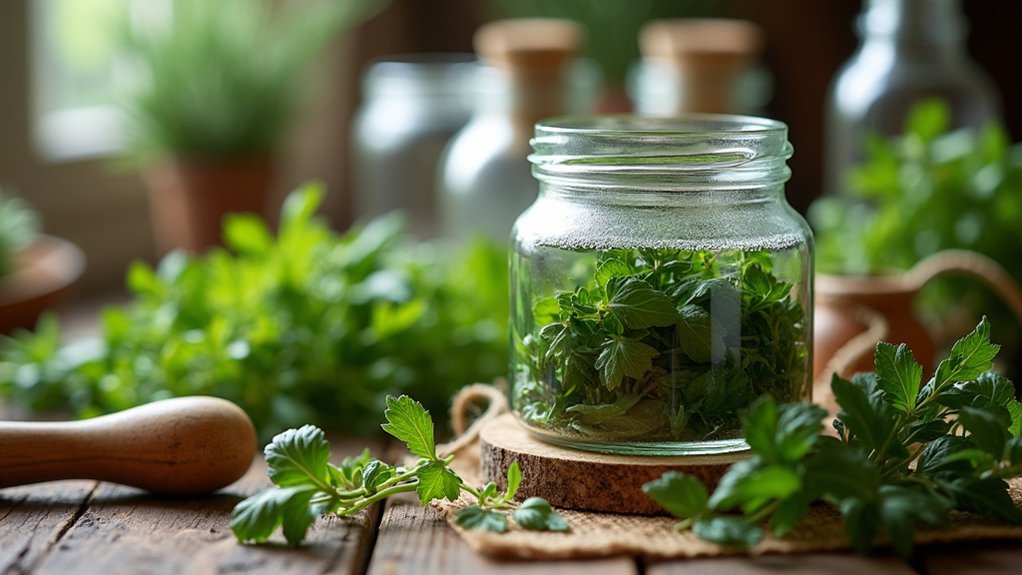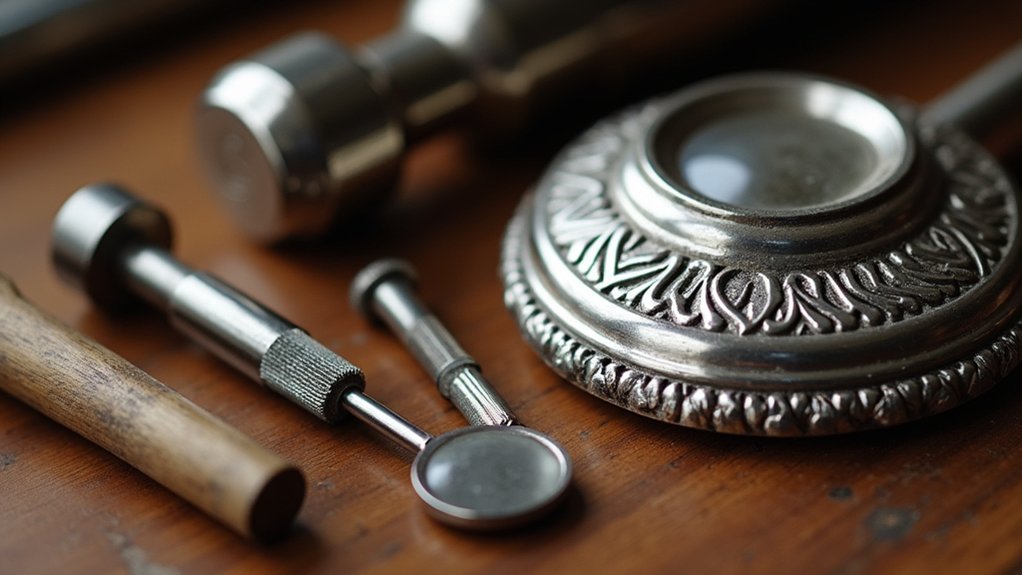You might be surprised at how pickle solutions can effectively clean various surfaces without causing damage. Contrary to popular belief, these brines aren’t just for flavoring food—they contain natural acids and compounds that break down grime while being gentle enough for delicate materials. Whether you’re tackling household chores or looking for food-safe cleaning options, the right pickle solution can replace harsh chemicals in your cleaning routine. Let’s explore three outstanding options that deliver impressive results.
Mt. Olive Pickle Juice 100% Kosher Dill Pickle Brine, 64 Ounce Bottle
Athletes and health enthusiasts alike will find Mt. Olive’s 64-ounce bottle of Kosher Dill Pickle Brine incredibly versatile. You’ll experience relief from leg cramps and better hydration, while enjoying its distinctive slightly sour flavor.
This brine does double duty in your kitchen too. Use it to enhance cocktails, create zesty salad dressings, or marinate meats. Many users report improved digestion after consuming it, especially following rich meals or alcohol.
The simple ingredient list includes water, vinegar, sea salt, natural flavors, and turmeric—offering quality without excessive sodium. Despite occasional price concerns, customers consistently praise its effectiveness.
Best For: Athletes seeking muscle cramp relief, cooking enthusiasts looking for a versatile ingredient for marinades and dressings, and individuals with digestive issues who need a natural remedy.
Pros:
- Provides effective relief from leg cramps and serves as a post-workout hydration solution
- Versatile kitchen ingredient that enhances cocktails, salad dressings, and marinades
- Contains simple, natural ingredients including water, vinegar, sea salt, and turmeric
Cons:
- Price point is higher than pickle juice available at local grocery stores
- Slightly more sour than traditional pickle jar brine, which may not appeal to all tastes
- Large 64-ounce bottle may be inconvenient for those who only need small amounts
Jersey Pickles – Sour Pickled Tomatoes (Gallon)
Pickle enthusiasts seeking robust flavor will find Jersey Pickles’ Sour Pickled Tomatoes a standout option in gallon-sized glory. These vibrant, tangy tomatoes deliver a satisfying crunch that elevates salads, sandwiches, and appetizer plates.
While many customers rave about their deliciousness and filling quality, you should be aware of potential shipping challenges. Reports indicate inconsistent delivery conditions, including broken seals and leaking containers that raise food safety concerns.
Customer service responsiveness appears limited when issues arise, making returns difficult. Consider these factors alongside the premium pricing when deciding if these zesty pickled tomatoes are worth adding to your culinary collection.
Best For: Pickle enthusiasts who appreciate tangy, crunchy tomatoes for enhancing salads, sandwiches, and appetizers, and who are willing to risk potential shipping issues for a unique flavor experience.
Pros:
- Delivers vibrant, tangy flavor with a satisfying crunch that many customers find delicious
- Versatile ingredient that works well in various dishes from salads to sandwiches
- Gallon size offers good quantity for regular pickle lovers or for entertaining
Cons:
- Significant shipping issues reported including broken seals, leaking containers, and warm arrivals raising food safety concerns
- Limited customer service and difficult return process when problems occur
- Some customers found the taste underwhelming compared to expectations and not worth the premium price
CleanBoss Eat Cleaner Triple-Action Fruit + Veggie Wash (Pack of 3)
For health-conscious families looking to eliminate harmful residues on their produce, CleanBoss Eat Cleaner offers a superior washing solution that goes beyond what water alone can achieve. This lab-proven formula removes dirt, chemicals, and pesticides 99% more effectively than water.
You’ll appreciate how it extends your produce’s shelf life up to five times longer while inhibiting browning on cut fruits. The triple-pack includes a trigger sprayer with improved nozzle design. USDA Certified Biobased and EPA Safer Choice certified, it’s vegan, gluten-free, and hypoallergenic—perfect for your family’s safety. Rinse thoroughly after use to avoid any aftertaste.
Best For: Health-conscious families who want to thoroughly clean their produce, extend its shelf life, and reduce exposure to potentially harmful residues on fruits and vegetables.
Pros:
- Removes pesticides, chemicals, and dirt 99% more effectively than water alone
- Extends produce shelf life up to 5 times longer and prevents browning of cut fruits
- USDA Certified Biobased and EPA Safer Choice certified, making it safe for families and the environment
Cons:
- Some users report issues with the trigger sprayer mechanism
- Requires thorough rinsing to avoid potential aftertaste on produce
- More expensive than simply using water for produce cleaning
Factors to Consider When Choosing Pickle Solutions That Clean Without Damaging
When choosing pickle solutions that clean effectively without causing damage, you’ll need to evaluate the acidity level and brine concentration that matches your specific cleaning needs. You should consider whether natural or chemical ingredients better suit your preferences for safety, effectiveness, and the materials you’re cleaning. Your decision should also account for environmental impact, product compatibility with different materials, and how efficiently the solution can be applied to your cleaning tasks.
Acidity and Brine Concentration
Because every cleaning task presents unique challenges, understanding the relationship between acidity and brine concentration in pickle solutions is essential for effective, non-damaging results. Look for brines with acidity levels between 3-5% acetic acid – this sweet spot offers cleaning power while minimizing potential damage to surfaces.
Be cautious with highly concentrated brines. While they’re excellent preservatives and cleaners, they can corrode or degrade materials when overused. The salt-acid balance matters too; salt enhances cleaning properties and acts as a natural preservative, creating a more effective solution.
Always check the pH level before application. Lower pH solutions kill germs more effectively but may be harsher on delicate surfaces. Also consider additional ingredients, as flavors and additives can alter cleaning effectiveness on various materials.
Natural Versus Chemical Ingredients
Why choose between effectiveness and environmental responsibility when you can have both? Natural ingredients like vinegar and citrus extracts break down dirt effectively while being safer for you and the environment. Unlike their chemical counterparts, these solutions don’t leave harmful residues on surfaces and are less likely to trigger allergic reactions.
You’ll appreciate that natural cleaning agents offer antimicrobial properties that disinfect without causing skin irritation or respiratory issues common with harsh chemicals. Their biodegradability further enhances their appeal, reducing environmental impact compared to synthetic alternatives that contribute to pollution.
When shopping for eco-friendly options, look for certifications such as USDA Biobased or EPA Safer Choice. These labels confirm the product’s commitment to natural ingredients that clean thoroughly without compromising your health or the planet.
Product Material Compatibility
Natural cleaning power means little if your pickle solution damages the very items you’re trying to clean. When selecting a pickle solution, you’ll need to verify it’s compatible with your item’s material composition.
Check the manufacturer’s recommendations first, as acidic ingredients like vinegar can corrode metals or harm certain plastics. Be particularly cautious with wood and porous surfaces, which might absorb the solution and retain unwanted flavors or odors.
Pay attention to the solution’s pH level—lower pH formulas work better on organic residues but can be too harsh for delicate materials. Before applying any solution extensively, conduct a spot test on an inconspicuous area to check for adverse reactions.
Compatibility isn’t just about preventing damage—it’s about maintaining your item’s integrity while effectively cleaning it.
Environmental Impact Concerns
While achieving squeaky-clean results remains important, the environmental consequences of your pickle solution deserve equal consideration. Traditional formulations often contain chemicals that contribute to pollution when rinsed away, potentially harming aquatic ecosystems.
Look for biodegradable, non-toxic ingredients that break down safely after use. Products with non-GMO and cruelty-free certifications typically meet stricter environmental standards, protecting wildlife and habitats. Pay attention to packaging—recyclable containers considerably reduce landfill waste compared to single-use alternatives.
Consider the carbon footprint of manufacturing and shipping your pickle solution. Some brands now offer concentrated formulas that require less packaging and fuel for transportation. By selecting environmentally responsible pickle solutions, you’re not just cleaning effectively—you’re also protecting our planet for future generations.
Application Method Efficiency
Selecting the right application method for your pickle solution greatly impacts both cleaning performance and surface preservation. Trigger sprayers stand out as an excellent choice, offering even coverage and precise control over the amount of solution you’re applying. This reduces waste while ensuring thorough cleaning of your surfaces.
When comparing cleaning solutions, remember that effective formulations can be over 99% more effective than water alone at removing contaminants. Choose non-toxic cleaners that are safe for food contact surfaces to enhance both safety and cleanliness.
After application, don’t skip the rinsing step—thorough rinsing prevents residue and aftertaste that could compromise food safety. The right combination of application method and solution formulation will help you achieve superior cleaning results without damaging delicate surfaces.
Frequently Asked Questions
Can Pickle Juice Clean Tarnished Brass or Copper Items?
Yes, you can use pickle juice to clean tarnished brass or copper items. The acid in pickle juice works effectively on metal tarnish. Just apply it, let it sit briefly, then rinse and dry thoroughly.
Is Pickle Brine Safe for Cleaning Colored Fabrics?
No, pickle brine isn’t safe for colored fabrics. The vinegar and salt can fade dyes and damage delicate materials. You’ll want to use mild detergents specifically formulated for colored clothes instead for best results.
How Long Can Homemade Cleaning Pickle Solutions Be Stored?
Homemade cleaning pickle solutions typically last 1-2 weeks in airtight containers. You’ll know it’s expired when the smell changes or mold appears. For best results, you’re better off making small, fresh batches.
Can Pickle Solutions Remove Hard Water Stains From Glass?
Yes, you can use pickle solutions to remove hard water stains from glass. The acidity in vinegar or lemon juice breaks down mineral deposits effectively. Just apply, let sit, and wipe away the residue.
Are There Any Surfaces Pickle Cleaning Solutions Should Never Touch?
Don’t use pickle cleaning solutions on marble, granite, natural stone, aluminum, brass, copper, or silver. They’re too acidic and will damage these surfaces. Wood and some plastic surfaces can also be harmed.





Leave a Reply